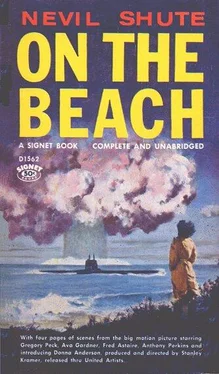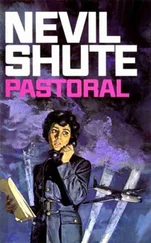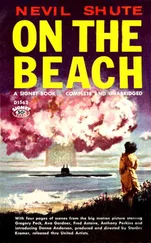version="1.0" encoding="utf-8"?> sf_postapocalyptic Nevil Shute On The Beach
Nevil Shute's "On The Beach" is a classic for good reason. Shute takes the most horrific event one can imagine—a worldwide nuclear event—and then turns the microscope on it, focusing in on just a few ordinary people who must wait for death as it drifts over to their hemisphere. We see military personnel, housewives, businessmen, and more. They come alive because they are just like you and me and the people next door.
Shute's very great accomplishment here is to examine how each of the characters deals with their certain death. Everyone knows they'll die eventually; these characters have the difficulty of knowing that death will arrive soon, and that it will be slow and agonizing. What do they do? Each reacts differently and the humanity and humility with which some of the characters make their choices is startlingly powerful. Especially in a time when the world seems so uncertain, so cruel, this is an important book to read—or re-read if you picked it up years ago. Prepare yourself for a powerfully moving experience.
"THE MOST IMPORTANT AND DRAMATIC NOVEL OF THE ATOMIC AGE"
—WASHINGTON POST AND TIMES HERALD
THE GREAT INTERNATIONAL BESTSELLER — OVER 3,000,000 COPIES SOLD!
A WORLD WAITING TO DIE
The radioactive winds had not yet hit Australia. There, survivors of the accidental nuclear war, men and women destined to be the last human beings on earth, prepared for extinction. Some found solace in religion, others in alcohol and frenzied sex, and hundreds stood waiting for their government ration of cyanide pills, hoping they would not have to use them—knowing they would.
NEVIL SHUTE'S MAGNIFICENT AND MOVING BESTSELLER—
"What a terrific Shute this is against the supreme folly of our times. As a piece of writing it is terrific. As a world warning it is more terrifying than anything yet put into print: It compels staying until the dreadful finish."
—Brig. General S.L.A. Marshall
1957 en ktotam Fiction Book Investigator 1.0
In this last of meeting places
We grope together
And avoid speech
Gathered on this beach of the tumid river.
This is the way the world ends
This is the way the world ends
This is the way the world ends
Not with a bang but a whimper.
—T. S. Eliot
Lieutenant Commander Peter Holmes of the Royal Australian Navy woke soon after dawn. Pie lay drowsily for a while, lulled by the warm comfort of Mary steeping beside him, watching the first light of the Australian sun upon the cretonne curtains of their room. He knew from the sun’s rays that it was about five o’clock; very soon the light would wake his baby daughter Jennifer in her cot, and then they would have to get up and start doing things. No need to start before that happened; he could lie a little longer.
He woke happy, and it was same time before his conscious senses realized and pinned down the origin of this happiness. It was not Christmas, because that was over. He had illuminated the little fir tree in their garden with a string of coloured lights with a long lead to the plug beside the fireplace in the lounge, a small replica of the great illuminated tree a mile away outside the town hell of Falmouth. They had had a barbecue in the garden on the evening of Christmas Day, with a few friends. Christmas was over, and this—his mind turned over slowly—this must be Thursday the 27th. As he lay in bed the sunburn on his back was still a little sore from their day on the beach yesterday, and from sailing in the race. He would do well to keep his shirt on today. And then, as consciousness came fully to him, he realized that of course he would keep his shirt on today. He had a date at eleven o’clock in the Second Naval Member’s office, in the Navy Department up in Melbourne. It meant a new appointment, his first work for seven months. It could even mean a seagoing job if he were very lucky, and he ached for a ship again.
It meant work, anyway. The thought of it had made him happy when he went to sleep, and his happiness had lasted through the night. He had had no appointment since he had been promoted lieutenant commander in August and in the circumstances of the time he had almost given up hope of ever working again. The Navy Department, however, had maintained him on full pay throughout these months, and he was grateful to them.
The baby stirred, and started chuntering and making little whimpering noises. The naval officer reached out and turned the switch of the electric kettle on the tray of tea things and baby food beside the bed, and Mary stirred beside him. She asked the time, and he told her. Then he kissed her, and said, "It’s a lovely morning again."
She sat up, brushing tack her hair. "I got so burned yesterday. I put some calamine stuff on Jennifer last night, but I really don’t think she ought to go down to the beach again today." Then she, too, recollected. "Oh—Peter, it’s today you’re going up to Melbourne, isn’t it?"
He nodded. "I should stay at home, have a day in the shade."
"I think I will."
He got up and went to the bathroom. When he came back Mary was up, too; the baby was sitting on her pot and Mao’ was drawing a comb through her hair before the glass. He sat down on the edge of the bed in a horizontal beam of sunlight, and made the tea.
She said, "It’s going to be very hot in Melbourne today, Peter. I thought we might go down to the club about four, and you join us there for a swim. I could take the taller and your bathers."
They had a small car in the garage, but since the short war had ended a year previously it remained unused. However, Peter Holmes was an ingenious man and good with tools, and he had contrived a tolerable substitute. Both Mary and he had bicycles. He had built a small two-wheeled trailer using the front wheels of two motor bicycles, and he had contrived a trailer hitch both on Mary’s bicycle and his own so that either could pull this thing, which served them as a perambulator and a general goods carrier. Their chief trouble was the long hill up from Falmouth.
He nodded. "That’s not a bad idea. I’ll take my bike and leave it at the station."
"What train have you got to catch?"
"The nine-five." He sipped his tea and glanced at his watch. "I’ll go and get the milk as soon as I’ve drunk this."
He put on a pair of shorts and a singlet and went out. He lived in the ground floor flat of an old house upon the hill above the town that had been divided into apartments; he had the garage and a good part of the garden in his share of the property. There was a verandah, and here he kept the bicycles and the trailer. It would have been logical to park the car under the trees and use the garage, but he could not bring himself to do that. The little Morris was the first car he had ever owned, and he had courted Mary in it. They had been married in 1961 six months before the war, before he sailed in H.M.A.S. Anzac for what they thought would be indefinite separation. The short, bewildering war had followed, the war of which no history had been written or ever would be written now, that had flared all round the Northern Hemisphere and had died away with the last seismic record of explosion on the thirty-seventh day. At the end of the third month he had returned to Williamstown in Anzac on the last of her fuel oil while the statesmen of the Southern Hemisphere gathered in conference at Wellington in New Zealand to compare notes and assess the new conditions, had returned to Falmouth to his Mary and his Morris Minor car. The car had three gallons in the tank; he used that unheeding and another five that he bought at a pump before it dawned upon Australians that all oil came from the Northern Hemisphere.
Читать дальше












